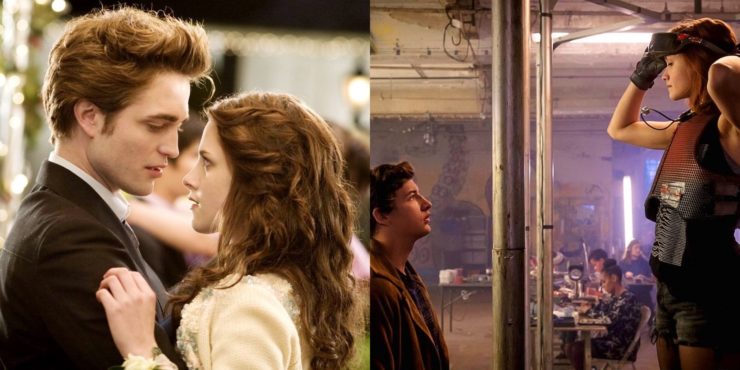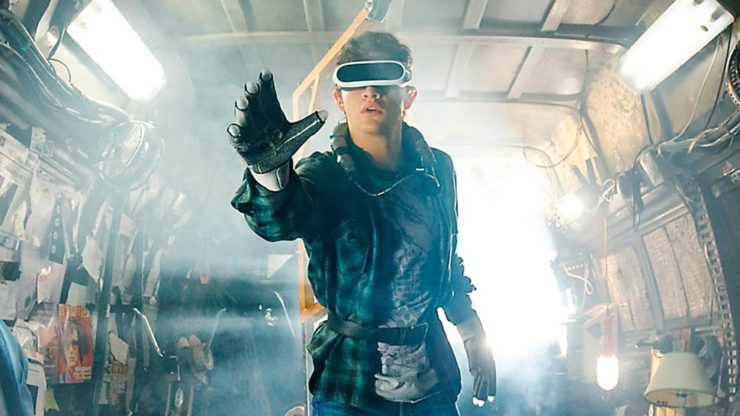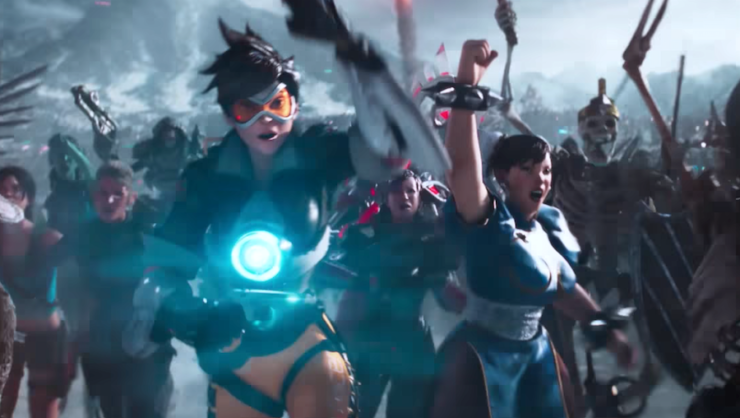In 2005, as many of you will recall, one writer’s wildly popular story created a gigantic cultural rift, even while many readers strongly identified with its teenaged protagonist. Stephenie Meyer’s Twilight had appeared on bookshelves everywhere and quickly gained mainstream attention for its depictions of fraught romantic relationships, and especially for turning horror icons like vampires and werewolves into romantic objects. The story strongly resonated with its target female demographic, and three sequels and a series of film adaptations followed, but this success nagged at people who took umbrage at the allegedly mediocre writing, overwrought love story, and sparkly monsters. Even while people endlessly mocked the divide between fans of Team Jacob and Team Edward, the true battleground was located between people who loved Twilight and those who had contempt for what many perceived as blatant indulgence in a cocktail of melodramatic romantic clichés.
Which brings us to 2011, where two more stories that struck an intense chord with readers’ fantasies—allowing many to picture themselves in the lead roles—hit our collective radar: E.L. James’ Fifty Shades of Grey, and Ernest Cline’s Ready Player One. The former has been lambasted as literal pornography, while the latter is frequently labeled “nostalgia porn.” And yet they are also two of the most popular and widely-known books to come out in recent years, and both have strong fan bases despite all the criticism. That’s not so surprising when it comes to Fifty Shades, since the story started out as fan fiction based on Twilight—some cross-over between the fans and critics of Meyer’s books and those following James’ work is to be expected. But why Ready Player One? What did Cline do to get caught up in this very familiar looking crossfire between haters and rabid fans?
“It doesn’t have to be a literary masterpiece”
As you all probably know, Ready Player One is getting a theatrical release later this month, directed by Steven Spielberg, so attention on the story has inevitably intensified. The first trailer for the movie did little to actually explain the plot. Viewers were simply bombarded with cameos of King Kong, Harley Quinn, Lara Croft, Akira’s motorcycle, Gandalf, Overwatch’s Tracer, Back to the Future’s DeLorean, and an expectation people would love it. To be fair, though, that’s a pretty similar experience to reading the book.
When I first read the novel some years ago, I found it endearing, initially. Reading about a lower income guy having fun playing classic games like Golden Axe with his friends was relatable to me. The silly debates about superheroes and movies immediately provided some solid characterization and gave me a sense of who Wade Watts was, and I was ready to enjoy learning more about him. The problem is, I never really did.
The relentless references soon started wearing thin, and Wade’s ability to effortlessly conquer his challenges—like playing a perfect game of Pac-Man—started feeling empty and undeserved. By the time one of Wade’s obstacles for saving the world entails him and his friends reciting dialogue from Monty Python and the Holy Grail (a feat they accomplish with glee), I felt like a kid who thinks eating an entire cake by himself sounded fun—I was sick of it, and craving something of real substance. But the thing is, Cline really loves the ‘80s and expects the reader to feel the same. If he’s right to think that this affection is enough to carry the reader along on its own, then his deluge of pop culture references makes sense. If he’s wrong, the reader is left with references they either don’t know or don’t care about, an onslaught of nerdy nostalgia that often doesn’t advance the plot, and very simplistic writing. As in, even more basic than Twilight’s writing. In fact, film analyst Lindsay Ellis recently released a video apologizing to Meyer for getting caught up in the frenzy of bashing Twilight years ago, and acknowledging now that Meyer’s writing is really not as atrocious as everyone makes it out to be. A book Ellis mentions as having legitimately terrible writing, on the other hand? Ready Player One.
The most common defense I’ve seen of Ready Player One’s writing (and basically any popular book being critiqued for its writing quality) is that not everything has to be a “literary masterpiece.” Which is true enough. However, one of the problems that repeatedly yanked me out of enjoying the book were the many sections that couldn’t even be called mediocre prose, but instead read like Wikipedia entries awkwardly mashed into fan fiction.
I made a big entrance when I arrived in my flying DeLorean, which I’d obtained by completing a Back to the Future quest on the planet Zemeckis. The DeLorean came outfitted with a (nonfunctioning) flux capacitor, but I’d made several additions to its equipment and appearance. First, I’d installed an artificially intelligent onboard computer named KITT (purchased in an online auction) into the dashboard, along with a match red Knight Rider scanner just above the DeLorean’s grill. Then I’d outfitted the car with an oscillation overthruster, a device that allowed it to travel through solid matter. Finally, to complete my ‘80s super-vehicle theme, I’d slapped a Ghostbusters logo on each of the DeLorean’s gullwing doors, then added personalized plates that read ECTO-88.

The story frequently pauses to rattle off references like this. Wade’s car isn’t even some major plot point in the story. It’s just supposed to sound cool. In fact, Cline thought it sounded so cool that he made that monstrosity in real life. Which brings us to our next point—Ready Player One is just a book about Ernest Cline’s personal fascination with the past.
Mary Sues
Subpar writing can be saved by an interesting idea, and obviously Cline’s novel provides that for many people. Ready Player One does have its intriguing moments, like reality becoming so impoverished and environmentally unstable that even things like the education system have switched over to the virtual world of the OASIS. But these details are fleeting glimpses of worldbuilding that Cline doesn’t want to dwell on. He’d rather dive into the worlds of fictional ’80s stories. Although it doesn’t make a whole lot of sense why his characters share the same interests…
Ready Player One takes place in 2044 and is about teenagers. Now, I was born in the ’90s and have barely any feelings of nostalgia for the ’80s. So…why do kids 60 years distant from the 1980s care at all about that particular decade? Sure, James Halliday (the creator of the OASIS) loved the ’80s and left a lucrative prize for people who share his fascination with the decade, but the OASIS has clearly evolved beyond simply being a game. Teachers, musicians, and some in other careers have transitioned over to working full-time in this virtual world. There are people in the OASIS who have no fascination with the ‘80s and don’t waste any time obsessing over Halliday’s Easter egg. So it’s pretty bizarre that Wade and his friends would fixate on one time period so completely (which is probably why the movie has updated the OASIS to include more modern references as well, including Overwatch and The Iron Giant).
Furthermore, it’s dull to watch characters succeed without actually being challenged, rewarded purely for being preoccupied with the right bits of pop culture. Wade is never forced to grow or even made to step out of his comfort zone by Halliday’s trials because he’s just doing the same nerdy things he already enjoys, like reciting all the lines to WarGames and playing old games. People have often called Bella Swan a Mary Sue, but she’s got nothing on Wade Watts, who conquers all of his “challenges” with delighted enthusiasm. And at least Stephenie Meyer has never given fans any reason to think that she’s obsessed with werewolves and vampires in real life. Cline is a man who not only owns a DeLorean, but even tried to persuade a cop to alter one of his speeding tickets to serve as “proof that I did 88 miles an hour in a DeLorean with a flux capacitor” just for the Back to the Future reference. If collecting pop culture memorabilia brings you joy, have at it, but instances like this over-the-top response to being stopped for something illegal and dangerous have likely added to the backlash against Cline. There’s also the fact that Meyer’s other work as an author, like her 2016 thriller The Chemist, show that she’s not too stuck in the world of Twilight to try other things. Cline, on the other hand? His follow-up novel doesn’t exactly tread new ground.
She looks awfully familiar…

Another point that’s frequently brought up in discussions of Ready Player One is the book’s treatment of and attitudes toward women. There are only two major female characters in the story, one of whom is digitally disguised as a guy until almost the end of the book; the other is a love interest who Wade winds up stalking before she ultimately falls for him. Those elements taken on their own could potentially be overlooked, but once I’d read Cline’s follow-up novel, Armada, his approach to writing women definitely gave me pause. Armada’s protagonist, Zack Lightman, first introduces us to his mom by thinking to himself how she’s always reminded him of Sarah Connor or Ellen Ripley due to her protective personality. Fair enough. But then Zack mentally describes his mother’s appearance in the following terms:
My mother was also ridiculously beautiful. I know people are supposed to say things like that about their mothers, but in my case it happened to be a fact. Few young men know the Oedipal torment of growing up with an insanely hot, perpetually single mom.
It’s not often that I read a line so terrible that it makes me want to stop reading a book immediately, but that one brought me awfully close. And Cline clearly writes protagonists in a way that he thinks is relatable to his fellow pop culture-obsessed nerds, geeks, and gamers. So…does he somehow believe that guys who play video games and read comics normally think about having sex with their moms? If his poem “Nerd Porn Auteur” expresses how he really feels, then maybe he does:
I shall be the quintessential Nerd porn Auteur.
And the women in my porno movies will be the kind
that drive nerds like me mad with desire.
He’s definitely got the nerd porn part down, but his writing of women has missed the mark for many people. Even the love interest in Armada feels like a clone of Ready Player One’s Art3mis. Twilight has received a lot of criticism over how Bella holds up as a female role model and whether her relationships romanticize unhealthy or toxic patterns that young women and girls might be drawn to emulate. But, at the very least, Meyer’s women feel distinct in their roles and personalities. I’m hoping Cline’s next book has a female protagonist, because I’d be very curious to see how he’d handle a story from a woman’s perspective.
Mixed Messages

Armada, while successful, was also far less well-received than Cline’s debut novel, with reviewers pointing out that it seemed derivative of stories like Ender’s Game and The Last Starfighter, so perhaps the author is not as adept at speaking for fandoms as he believes. Personally, I did manage to finish it, but sci-fi isn’t my genre, so now I understood more acutely what many of the people who disliked Ready Player One had felt: there’s little joy to be had if you don’t instantly recognize the pop culture references.
Rather than describe what spaceships or weapons look like, we are told instead that they look like props from Iron Eagle or Star Trek. You haven’t watched those? Too bad, that’s all the detail you’re getting while trying to visualize the story. Cline often simply name-drops his references into the text, as if readers might experience a thrill just by seeing things they might enjoy randomly acknowledged in passing. If the names being dropped aren’t familiar, however, the text is basically meaningless. Worse yet, the explanations he does provide can over-describe basic information, like the account of what a Rubik’s Cube is in Ready Player One. This reliance on these references makes even less sense in Armada than in Ready Player One because now there’s no plot device like the OASIS tying the world to the ’80s. So why are teenagers still referencing Space Invaders and Galaga instead of Borderlands and Mass Effect? Because the former are what Cline grew up with, so he expects the reader to love them, too.
Except this time, they didn’t. In the wake of Armada, critics began suggesting that Cline’s nostalgia-fueled fiction was a one-trick pony. And it doesn’t seem like his third novel will be doing much to dissuade detractors from that view, seeing as how he’s already announced it will be Ready Player Two. I should note that, despite everything I’ve said, I actually am looking forward to this sequel—I can acknowledge all of Ready Player One’s problems, but it’s an easy enough read that I can’t help being curious to see where the story goes next. That’s because there actually are brief flashes in Cline’s work that suggest he’s self-aware enough to realize that his pop culture-crazed characters aren’t living such great lives, which potentially leaves room for growth and exploration if that’s what Cline is intending.
Ready Player One’s snippets of social commentary include moments like Wade’s internet addiction leading to him becoming morbidly obese and viewing himself as pathetic once he starts masturbating with a sex doll. At the novel’s end, it’s suggested he might shut down the OASIS to find happiness in reality instead. I was relieved when I first read this ending because I thought it implied a sense of self-awareness and much-needed introspection on the author’s part. But then Cline wrote the same book in Armada. Not only that, but both his novels featured Easter egg hunts hidden in the text so the reader could live out an adventure like Wade and potentially be rewarded with a prize for solving the challenges revealed in the books. That seems to contradict, at least somewhat, the sense that there should be more to life than obsessive fandom and nostalgia porn—at best, Cline seems to be sending mixed messages when it comes to his characters’ capacity for self-awareness and growth, and perhaps his own.
Meanwhile the issues with Twilight’s themes and overall message have been well-documented. The enormous age difference between Edward and Bella, the perceived anti-feminism of the characterizations, the romanticized portrayal of obsession and reinforcement of regressive gender roles, and dubious moments like Jacob imprinting on Bella’s infant daughter are all commonly cited points of contention. But many people dislike or dismiss Twilight even before knowing about those details, so what is it about the story as a whole that gets people so worked up?
What it says about us
In Ellis’ analysis of Twilight, she attributes a significant amount of the scorn leveled at Meyer’s work to misogyny aimed at things teenage girls enjoy. She points out that terrible movies geared towards teenage boys, such as The Fast and The Furious franchise or the Transformers movies, don’t receive near as much impassioned vitriol, by comparison. People acknowledge that Transformers: Revenge of the Fallen sucked, maybe make fun of it a bit and scratch their heads over why Michael Bay is still getting directing opportunities, then move on—it just doesn’t stir up the same levels of hatred and animosity. So maybe it really is as simple as that: “girly” things are viewed as stupid and mercilessly mocked, while stuff targeted to guys gets protected behind the label of “nerd culture.” But as the title of this article implies, I think Ready Player One will finally break down that barrier, for better or worse. I expect the Ready Player One movie to be profitable, very popular among its target audience…and also get eviscerated in reviews. Exactly like what happened with Twilight.
Honestly, I don’t think either story is deserving of scorn. The books aren’t great literature, but they’ve clearly brought a large number of people some joy. The Da Vinci Code arguably had the same effect back when it was first released in 2003. So when I compare Ready Player One to Twilight, I don’t mean to imply that either story deserves to be torn apart for fun. It’s simply to point out that we have seen this backlash before, and these fantasies haven’t harmed anyone (Fifty Shades of Grey probably shouldn’t get that same pass, though…but that’s a different conversation). If people want to indulge in reading about a story you think is stupid, why get worked up about it?
I’m a big fan of pro wrestling, so I know what it’s like to enjoy something a lot of people think of as the dregs of entertainment. I don’t blame people who say it’s not for them, but I always roll my eyes at the person whose only contribution to a conversation about wrestling is to say, “You know it’s fake, right?” That’s not a revelation to anyone, and I expect it’s no revelation to fans of Meyer or Cline to hear that these books will never win the Pulitzer. Sometimes something is just fun, and that’s all you’re looking for. That’s all Cline seems to need, as a writer, and that’s all many of his readers want from his stories. I don’t think the lesson from Twilight should be that Ready Player One needs to be blasted in the same fashion, but rather that you can acknowledge the flaws of something without joining a hate mob or attacking anyone else for enjoying it. By the end of Twilight’s shelf life, people talking about how much they disliked the series had become far more tiresome than those who enjoyed it.
So, if you don’t like Ready Player One and have criticisms about it, that’s totally understandable. If you feel that there were more deserving scripts for Steven Spielberg to work on, or authors more deserving of publication than Cline, that’s also fair. I’ll certainly point out the issues I have with his stories, but I’m not going to delight in mocking his work or hoping for his failure like many did with Meyer and Twilight.
I do hope that Cline, as a writer, follows the moral of his own novel and moves on from an arrested development stuck in the 1980s, but I don’t begrudge the guy any of his success. He’s having fun playing with his favorite toys and he’s inviting other people to play along. If it satisfies you to have an author buddy with whom you can connect and celebrate the beloved touchstones of your childhood, I respect that. But I also feel the same as many others who just don’t find the joys of yesterday to be all that fascinating. Much like Wade, Cline is the equivalent of the kind of friend who’s always up for playing an old video game, and once in a blue moon I might take him up on the offer. But after hearing “How about one more game?” for the twentieth time in one night, I’m content to step away for a good long while, and let the screen fade to Game Over.
Chris Isaac writes for Screen Rant. His work also includes essays for USA TODAY, talking feminism in games for The Mary Sue, and examining mental illness depictions in the media for Arcadia University’s Compass. If these things interest you, you can follow him on Twitter.










